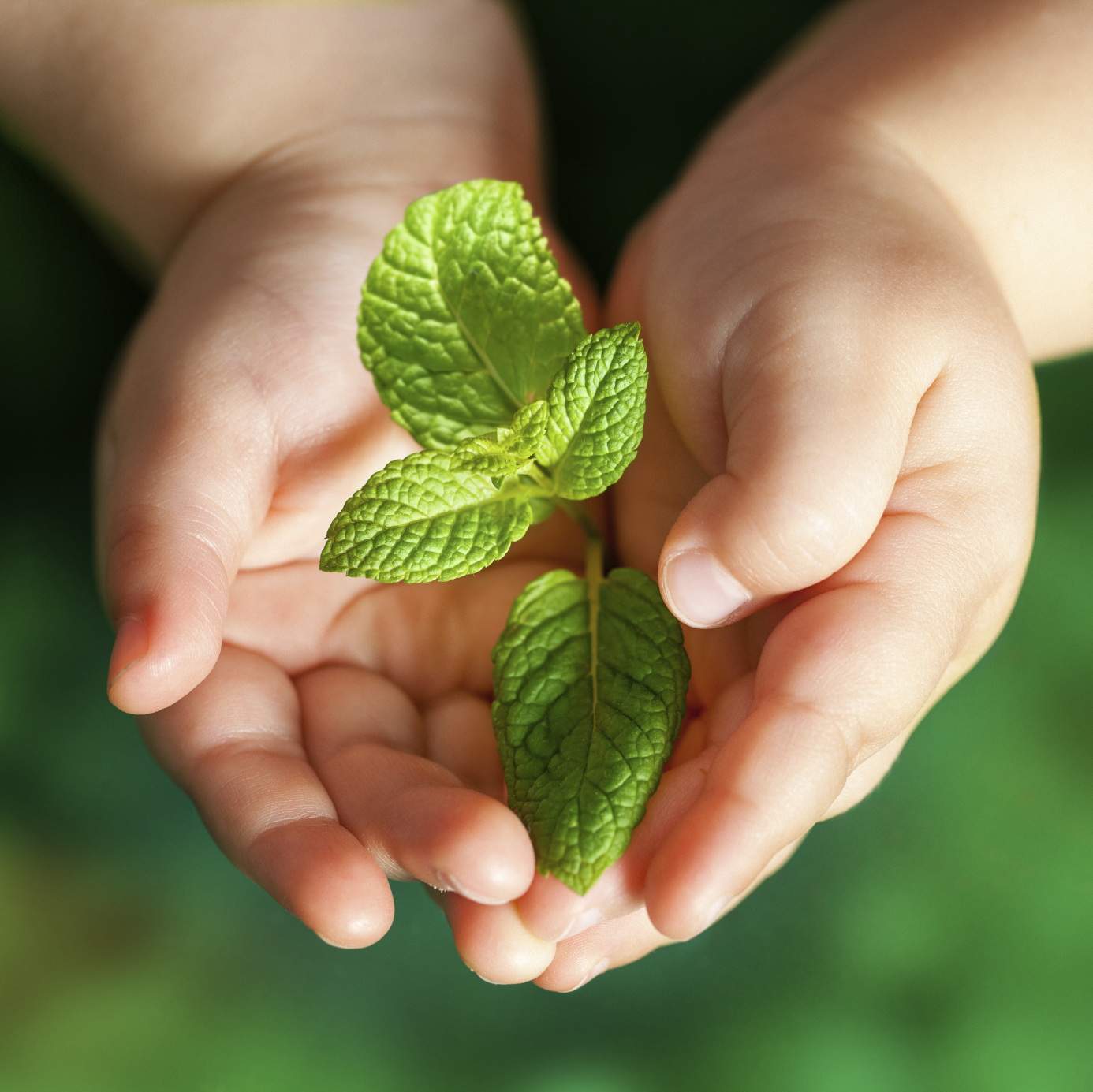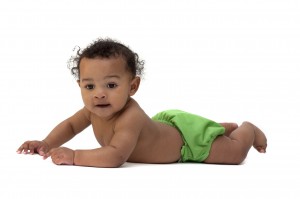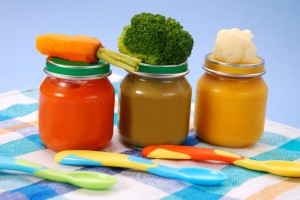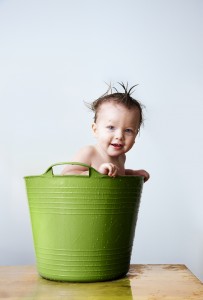Eco-Friendly Baby Products: What’s worth your green? | by

I recently attended a post-story time coffee with several new moms. “You guys,” one of them leaned forward whispering, as if about to confess to switching her baby at birth or, worse, swiping another woman’s Orbit luxury stroller, “when we were on vacation, we used real laundry detergent.”
When this mom spoke of using conventional laundry detergent with as much remorse as my husband uses when apologizing for eating the last slice of cheesecake, I knew this green thing had gone too far. Among new moms these days, it seems to be a competition to see who’s raising their baby ‘greenest.’ Mommy points – or guilt – are doled out depending on how you diaper, feed and dress your baby. But are we taking it too far?
Every mom wants to provide the best and safest products for her baby, but we also have finite resources when it comes to money, time and energy. “Whether or not to buy green products has more to do with one’s philosophy and wealth than with what is better for one’s baby,” says Dr. Jay Rabinowitz, a pediatrician at Parker Pediatrics and Adolescents and Clinical Professor of Pediatrics at the University of Colorado. “Too often, parents are guilted into buying products that offer little or no advantage for their baby.”
Here, experts weigh in on diapers, feeding, clothes, baby toiletries and the aforementioned detergents – to see which green things matter most and which are just a waste of green.
Diapers
The issue: Inevitably, your baby will go through thousands of diapers. (Yes, thousands.) And since she’ll be wearing them 24 hours a day, whether you choose to use cloth or disposable diapers is a big decision.
In terms of the environment, it comes down to water v. trees. Whereas disposable diapers use more trees and plastics in their production (and take up more space in landfills), cloth diapers aren’t exactly innocent. The amount of water and energy used to clean them is significant.
Some studies have suggested that disposable diapers release volatile organic compounds (VOCs) that can have negative health effects when ingested, but it’s up in the air as to the effect they have on baby’s long-term health.
Expert weighs in: “There are definitely fewer diaper rashes with the newer disposable diapers than with cloth ones,” says Rabinowitz. “That does not mean that parents should choose these just for that reason, as cost and one’s environmental views are also important.” The American Academy of Pediatrics agrees, cautioning cloth diapering parents to change their babies more frequently to avoid diaper rash.
Is it worth it? With the cost of disposable and cloth diapers being fairly equal when you factor in cleaning costs, it really comes down to personal preferences and environmental concerns.
Feeding
The issue: And you thought the tough decisions concerning your baby’s nourishment ended at whether or not to breastfeed. Many conventional baby foods are made from produce sprayed with pesticides. Apples and peaches, for example, top the Dirty Dozen – the Environmental Working Group’s list of the twelve fruits and veggies with the most pesticide residue.
Expert weighs in: “Baby foods, whether organic or not, have the same nutritional value. It comes down to one’s ability to afford alternate options,” says Rabinowitz. The AAP says that it’s more important that parents offer their children a diet rich in fruits and vegetables – organic or not.
Is it worth it? You may want to choose organic when it comes to foods made from the Dirty Dozen, but ensuring that everything that goes into your baby’s mouth is organic is just unnecessary stress – and dollars.
Clothes
The issue: One of the downsides to the adorable tiny footed pajamas, onesies and dresses for babies is that they grow out of them so fast. Another is that the clothes could contain pesticides. Organic baby clothes are made with cotton or hemp that isn’t treated with chemicals. Traditional baby clothes are typically made of fabrics sprayed with pesticides, but they are also so heavily processed that the vast majority of the pesticide residues are washed out of the clothing before you ever button them up.
Expert weighs in: “Most babies won’t have an allergy or sensitivity to any of these,” Rabinowitz says. So unless your baby’s skin is irritated by a certain fabric, go ahead and buy what’s cutest instead of what’s certified organic.
Is it worth it? You’ll pay a significant premium for organic baby clothes for little benefit – and at the rate that babies grow it’s not worth the extra money for a onesie they’ll wear twice.
Baby Toiletries
The issue: Lotions, shampoos and diaper creams get massaged into your baby’s largest organ – his skin. Since baby’s skin is more porous than adults, he can absorb more of the not-so-clean stuff – like formaldehyde-releasing quaternium -15 and carcinogens – found in some baby cleaning products. Chemicals can cause some babies to have skin allergies or irritations.
Expert weighs in: “Unless a parent sees a problem, or there is a strong family history of a reaction to one of these, one need not spend extra money or time buying special products,” says Rabinowitz.
Is it worth it? If you’re skeptical about the chemicals found in some baby toiletries, try using household products like olive or coconut oil in place of conventional lotion. You’ll save money and skip the chemicals.
Baby Laundry Detergent
The issue: Between spit-up, diaper blowouts and adventures in eating, most new parents are on intimate terms with their washers and dryers. As sensitive skin is very common in babies, the fragrances and dyes in normal laundry detergent could potentially irritate it.
Expert weighs in: Experts agree that regular detergents are fine for most tots. If you notice skin irritation like dryness, red spots or itchiness, try switching to a baby or hypoallergenic/fragrance-free detergent to see if that helps.
Is it worth it? Only if your baby has a skin allergy or very sensitive skin.
Tags: Centennial, healthy, Highlands Ranch, parenting, pediatrician
Comments
Leave a Comment
Please be respectful while leaving comments. All comments are subject to removal by the moderator.

it is a nice idea to get away from diaper rash but real question is what steps need to follow.
1-use ecological diapers that are really workable in case of diaper rash.
2-do not use tightly cloth diaper.
3-keep diaper cream with you. in case your child get rashes.
what you think about ecological diapers that helps child to fight against dipaer rashes
חיתולים אקולוגיים
there are so many diapers in shops. which one should i choose.
i prefer ecological diapers to protect against diaper rash
תפרחת חיתולים